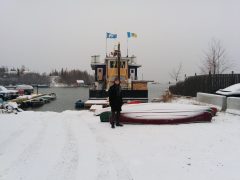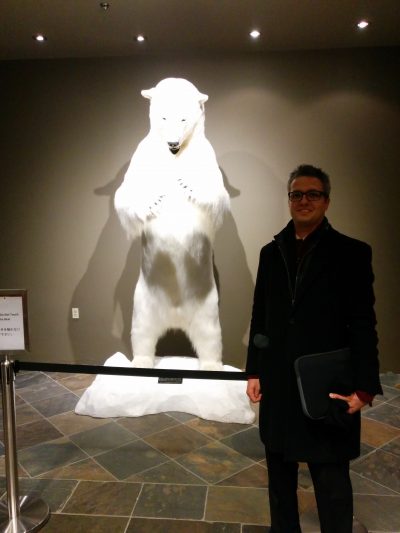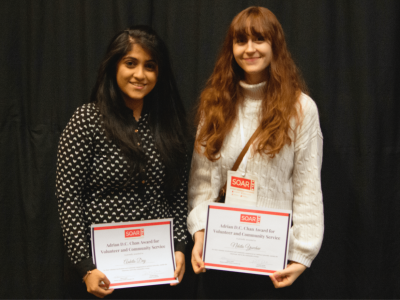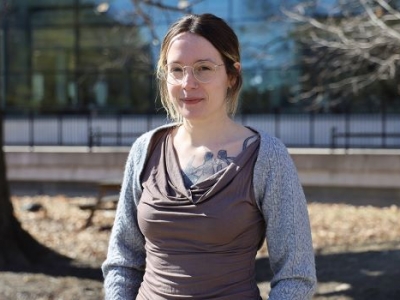Last year, the Northwest Territories suffered a dreadful drought that caused great financial strain on electricity for northerners and the government, as well as widespread forest fires.
Vincent Dufresne, a master’s student in Carleton’s Sustainable Energy Policy program, says most of the cores of the trees that were left standing from these fires could be chipped and burned for energy.
“If burned trees were to be harvested and used for heating or power generation, they could constitute a great source of cheap, low-carbon energy for years to come,” shares Dufresne.

Vincent Dufresne in Yellowknife
As part of his degree, Dufresne is researching alternative energy sources in the Arctic. He points out that most sources of energy in the North need to be subsidized in order to keep them affordable for people living there, which is why northerners are seeking alternative sources of energy.
“This may help reduce their dependency on energy subsidies, freeing up money for pressing needs to cover health, housing or food security costs,” says Dufresne.
Last fall, he went to Yellowknife to participate in a research project with the Canadian High Arctic Research Station (CHARS) entitled The State of Alternative Energy in the Arctic.
Carleton alumnus David Cherniak and professors Stephan Schott and Alexandra Mallett made up the rest of the Carleton contingent.
The research team also participated in an energy planning session held by the NWT government and delivered a workshop with Northern research partners.
Explains Dufresne: “The purpose of our research is to identify and document how decisions are made with regard to alternative energy in the Arctic, motivations and reasons for adopting alternative sources of energy, challenges that have slowed down the adoption of alternative energy to date, and potential solutions to increase the adoption of alternative energy when it makes sense.”
Prior to enrolling in the master’s program, Dufresne worked for 10 years in the energy efficiency field. He is a registered Engineer [in Quebec], a Certified Energy Manager and a Certified Measurement and Verification Professional. He has been involved in projects in a large number of countries, such as Chile, Uruguay and India, and domestically in Quebec, Ontario, Saskatchewan, BC and Yukon.
He chose to pursue the Sustainable Energy program at Carleton because of its multidisciplinary approach. “I liked that the program mixed economics, political science, public administration, engineering and business…I met a number of professors and liked their approach, dedication to teaching, world view and personal touch.” Students specialize in either engineering or policy, graduating with either an engineering degree (MASc or MEng in Sustainable Energy) or a public policy degree (MA in Sustainable Energy).
So far at Carleton, Dufresne says that his Arctic adventure has been one of his best experiences.
He also appreciates an opportunity to be involved in another research project PV as a Service in Rural Peru. This is a collaboration between Carleton and Light Up the World (LUTW), an NGO based in Calgary. The project is a new business solution to bring electrification at a lower cost to low-income households located too far away from the power distribution lines to be connected.
Once he graduates, Dufresne is planning to return to ICF, a 5,000-employee company headquartered near Washington DC, with dozens of offices across North America that specializes in all things sustainability. He hopes to take on new responsibilities further to the skills he gained in his Carleton grad program.

Vincent Dufresne in the lobby of the Explorer Hotel in Yellowknife
Monday, February 23, 2015 in Grad Student Research, News, Programs
Share: Twitter, Facebook




